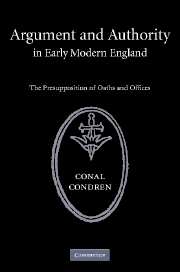Book contents
- Frontmatter
- Contents
- Preface
- Introduction
- Part I The liquid empire of office
- 1 An overview
- 2 Ceremonies of office: The kiss of the tutti-man
- 3 Institutionalised office: a sense of the scavenger
- 4 The vocabulary of office
- 5 Offices of the intellect: player, poet and philosopher
- 6 Soul and conscience
- Part II The authority and insolence of office
- Part III ‘I, A. B.’
- Epilogue
- Bibliography
- Index
5 - Offices of the intellect: player, poet and philosopher
from Part I - The liquid empire of office
Published online by Cambridge University Press: 28 October 2009
- Frontmatter
- Contents
- Preface
- Introduction
- Part I The liquid empire of office
- 1 An overview
- 2 Ceremonies of office: The kiss of the tutti-man
- 3 Institutionalised office: a sense of the scavenger
- 4 The vocabulary of office
- 5 Offices of the intellect: player, poet and philosopher
- 6 Soul and conscience
- Part II The authority and insolence of office
- Part III ‘I, A. B.’
- Epilogue
- Bibliography
- Index
Summary
He is very severe in his supposed Office, and cries, Woe to ye Scribes right or wrong … He is a Committee-Man in the Commonwealth of Letters and as great a Tyrant.
(Samuel Butler, Characters, 1667–9)Early modern England exhibited grave suspicion of the protean; but with ethical argument centred on personae, the conditions were ideal for constructing the very mutability it feared. The following two chapters will cast light on this tension. The next will show how a presupposition of office was characteristic of accounts of that most immutable and defining inner essence of humanity, the soul. This concerns the rhetorics of office used to sanction socialised, outer identities. Together they should make more historical sense of the post-Renaissance fascination with human identity that has proved to be such a fruitful theme in modern literary studies.
Moral autonomy was neither sought nor celebrated. In Protestant polemic, the denigrated priest is a shape-shifter and dissembler. ‘Sometime I can be a monk in a long sad cowl;/Sometime I can be a nun and look like an owl.’ The myth of Jesuit transmogrification proved sturdy. Unlike the silly sheep, wrote Daniel Tuvill, near the start of the seventeenth century, man can fashion his voice in as many dialects as ambition demands. Only the honest man, wrote Joshua Barnes a hundred years later, was not a changeling. Any suspicion of plasticity therefore, needed rationalisation. It was done through the language of office; anything else equalled villainy.
- Type
- Chapter
- Information
- Argument and Authority in Early Modern EnglandThe Presupposition of Oaths and Offices, pp. 105 - 124Publisher: Cambridge University PressPrint publication year: 2006

